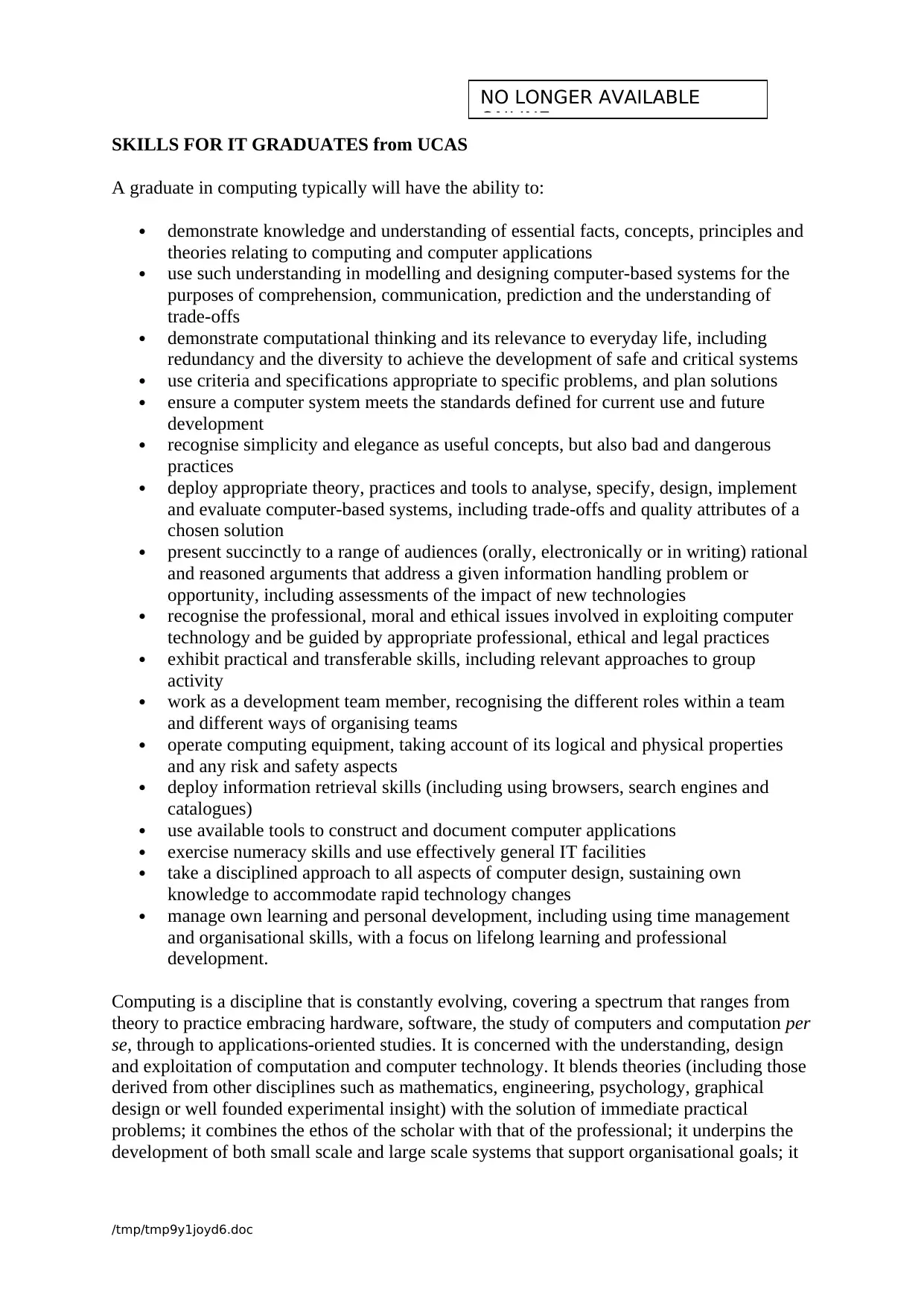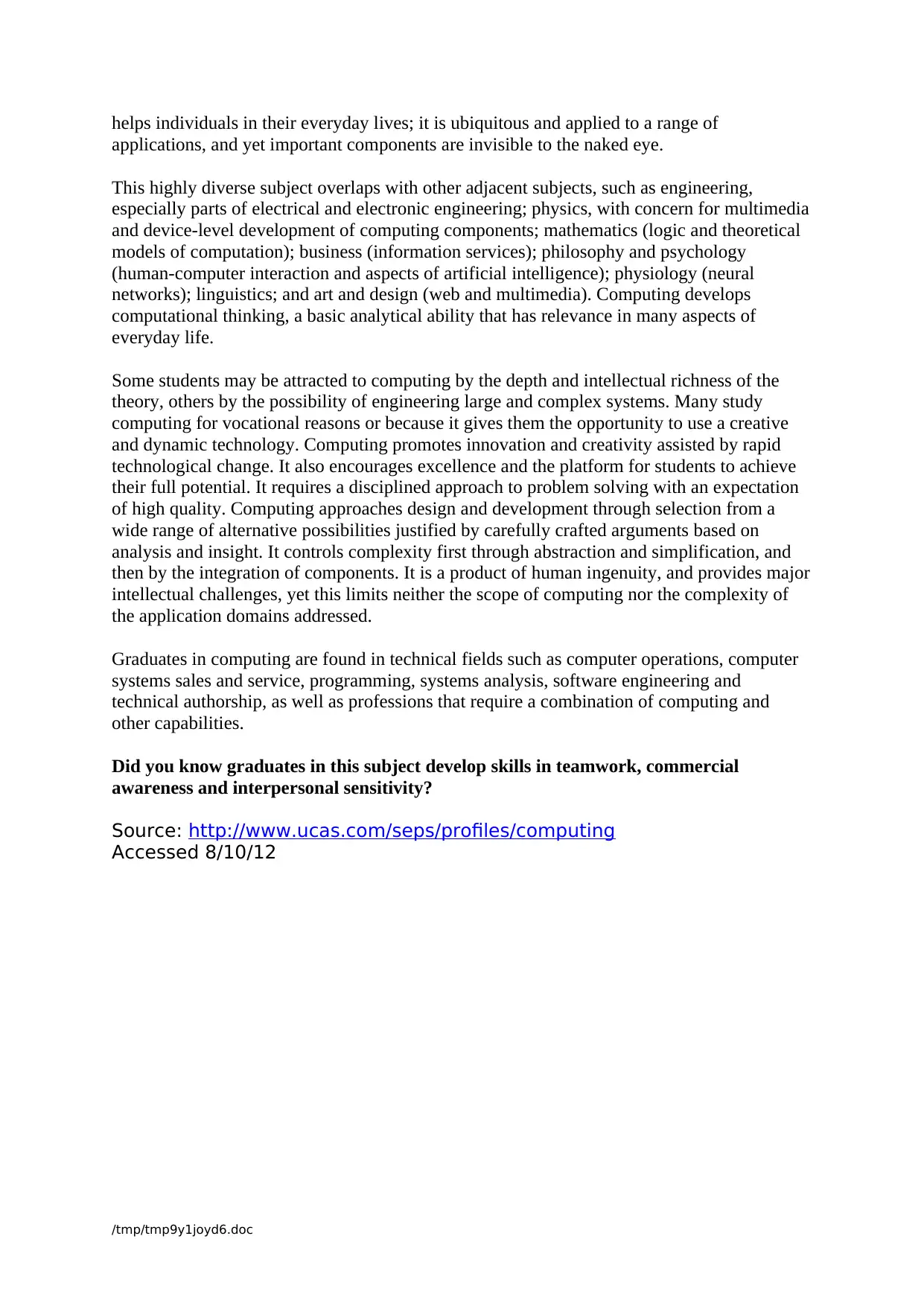Skills for IT Graduates Report
VerifiedAdded on 2019/09/16
|2
|853
|141
Report
AI Summary
This report, sourced from UCAS (Universities and Colleges Admissions Service), outlines the key skills and knowledge acquired by computing graduates. It emphasizes the diverse nature of the field, encompassing theoretical understanding, practical application, and ethical considerations. The report details a wide range of skills, including problem-solving, system design, teamwork, communication, and ethical practice. It also highlights the interdisciplinary nature of computing, drawing connections to mathematics, engineering, psychology, and other fields. The report concludes by mentioning the various career paths open to computing graduates, emphasizing the versatility of their skillset.

SKILLS FOR IT GRADUATES from UCAS
A graduate in computing typically will have the ability to:
demonstrate knowledge and understanding of essential facts, concepts, principles and
theories relating to computing and computer applications
use such understanding in modelling and designing computer-based systems for the
purposes of comprehension, communication, prediction and the understanding of
trade-offs
demonstrate computational thinking and its relevance to everyday life, including
redundancy and the diversity to achieve the development of safe and critical systems
use criteria and specifications appropriate to specific problems, and plan solutions
ensure a computer system meets the standards defined for current use and future
development
recognise simplicity and elegance as useful concepts, but also bad and dangerous
practices
deploy appropriate theory, practices and tools to analyse, specify, design, implement
and evaluate computer-based systems, including trade-offs and quality attributes of a
chosen solution
present succinctly to a range of audiences (orally, electronically or in writing) rational
and reasoned arguments that address a given information handling problem or
opportunity, including assessments of the impact of new technologies
recognise the professional, moral and ethical issues involved in exploiting computer
technology and be guided by appropriate professional, ethical and legal practices
exhibit practical and transferable skills, including relevant approaches to group
activity
work as a development team member, recognising the different roles within a team
and different ways of organising teams
operate computing equipment, taking account of its logical and physical properties
and any risk and safety aspects
deploy information retrieval skills (including using browsers, search engines and
catalogues)
use available tools to construct and document computer applications
exercise numeracy skills and use effectively general IT facilities
take a disciplined approach to all aspects of computer design, sustaining own
knowledge to accommodate rapid technology changes
manage own learning and personal development, including using time management
and organisational skills, with a focus on lifelong learning and professional
development.
Computing is a discipline that is constantly evolving, covering a spectrum that ranges from
theory to practice embracing hardware, software, the study of computers and computation per
se, through to applications-oriented studies. It is concerned with the understanding, design
and exploitation of computation and computer technology. It blends theories (including those
derived from other disciplines such as mathematics, engineering, psychology, graphical
design or well founded experimental insight) with the solution of immediate practical
problems; it combines the ethos of the scholar with that of the professional; it underpins the
development of both small scale and large scale systems that support organisational goals; it
/tmp/tmp9y1joyd6.doc
NO LONGER AVAILABLE
ONLINE
A graduate in computing typically will have the ability to:
demonstrate knowledge and understanding of essential facts, concepts, principles and
theories relating to computing and computer applications
use such understanding in modelling and designing computer-based systems for the
purposes of comprehension, communication, prediction and the understanding of
trade-offs
demonstrate computational thinking and its relevance to everyday life, including
redundancy and the diversity to achieve the development of safe and critical systems
use criteria and specifications appropriate to specific problems, and plan solutions
ensure a computer system meets the standards defined for current use and future
development
recognise simplicity and elegance as useful concepts, but also bad and dangerous
practices
deploy appropriate theory, practices and tools to analyse, specify, design, implement
and evaluate computer-based systems, including trade-offs and quality attributes of a
chosen solution
present succinctly to a range of audiences (orally, electronically or in writing) rational
and reasoned arguments that address a given information handling problem or
opportunity, including assessments of the impact of new technologies
recognise the professional, moral and ethical issues involved in exploiting computer
technology and be guided by appropriate professional, ethical and legal practices
exhibit practical and transferable skills, including relevant approaches to group
activity
work as a development team member, recognising the different roles within a team
and different ways of organising teams
operate computing equipment, taking account of its logical and physical properties
and any risk and safety aspects
deploy information retrieval skills (including using browsers, search engines and
catalogues)
use available tools to construct and document computer applications
exercise numeracy skills and use effectively general IT facilities
take a disciplined approach to all aspects of computer design, sustaining own
knowledge to accommodate rapid technology changes
manage own learning and personal development, including using time management
and organisational skills, with a focus on lifelong learning and professional
development.
Computing is a discipline that is constantly evolving, covering a spectrum that ranges from
theory to practice embracing hardware, software, the study of computers and computation per
se, through to applications-oriented studies. It is concerned with the understanding, design
and exploitation of computation and computer technology. It blends theories (including those
derived from other disciplines such as mathematics, engineering, psychology, graphical
design or well founded experimental insight) with the solution of immediate practical
problems; it combines the ethos of the scholar with that of the professional; it underpins the
development of both small scale and large scale systems that support organisational goals; it
/tmp/tmp9y1joyd6.doc
NO LONGER AVAILABLE
ONLINE
Paraphrase This Document
Need a fresh take? Get an instant paraphrase of this document with our AI Paraphraser

helps individuals in their everyday lives; it is ubiquitous and applied to a range of
applications, and yet important components are invisible to the naked eye.
This highly diverse subject overlaps with other adjacent subjects, such as engineering,
especially parts of electrical and electronic engineering; physics, with concern for multimedia
and device-level development of computing components; mathematics (logic and theoretical
models of computation); business (information services); philosophy and psychology
(human-computer interaction and aspects of artificial intelligence); physiology (neural
networks); linguistics; and art and design (web and multimedia). Computing develops
computational thinking, a basic analytical ability that has relevance in many aspects of
everyday life.
Some students may be attracted to computing by the depth and intellectual richness of the
theory, others by the possibility of engineering large and complex systems. Many study
computing for vocational reasons or because it gives them the opportunity to use a creative
and dynamic technology. Computing promotes innovation and creativity assisted by rapid
technological change. It also encourages excellence and the platform for students to achieve
their full potential. It requires a disciplined approach to problem solving with an expectation
of high quality. Computing approaches design and development through selection from a
wide range of alternative possibilities justified by carefully crafted arguments based on
analysis and insight. It controls complexity first through abstraction and simplification, and
then by the integration of components. It is a product of human ingenuity, and provides major
intellectual challenges, yet this limits neither the scope of computing nor the complexity of
the application domains addressed.
Graduates in computing are found in technical fields such as computer operations, computer
systems sales and service, programming, systems analysis, software engineering and
technical authorship, as well as professions that require a combination of computing and
other capabilities.
Did you know graduates in this subject develop skills in teamwork, commercial
awareness and interpersonal sensitivity?
Source: http://www.ucas.com/seps/profiles/computing
Accessed 8/10/12
/tmp/tmp9y1joyd6.doc
applications, and yet important components are invisible to the naked eye.
This highly diverse subject overlaps with other adjacent subjects, such as engineering,
especially parts of electrical and electronic engineering; physics, with concern for multimedia
and device-level development of computing components; mathematics (logic and theoretical
models of computation); business (information services); philosophy and psychology
(human-computer interaction and aspects of artificial intelligence); physiology (neural
networks); linguistics; and art and design (web and multimedia). Computing develops
computational thinking, a basic analytical ability that has relevance in many aspects of
everyday life.
Some students may be attracted to computing by the depth and intellectual richness of the
theory, others by the possibility of engineering large and complex systems. Many study
computing for vocational reasons or because it gives them the opportunity to use a creative
and dynamic technology. Computing promotes innovation and creativity assisted by rapid
technological change. It also encourages excellence and the platform for students to achieve
their full potential. It requires a disciplined approach to problem solving with an expectation
of high quality. Computing approaches design and development through selection from a
wide range of alternative possibilities justified by carefully crafted arguments based on
analysis and insight. It controls complexity first through abstraction and simplification, and
then by the integration of components. It is a product of human ingenuity, and provides major
intellectual challenges, yet this limits neither the scope of computing nor the complexity of
the application domains addressed.
Graduates in computing are found in technical fields such as computer operations, computer
systems sales and service, programming, systems analysis, software engineering and
technical authorship, as well as professions that require a combination of computing and
other capabilities.
Did you know graduates in this subject develop skills in teamwork, commercial
awareness and interpersonal sensitivity?
Source: http://www.ucas.com/seps/profiles/computing
Accessed 8/10/12
/tmp/tmp9y1joyd6.doc
1 out of 2
Related Documents
Your All-in-One AI-Powered Toolkit for Academic Success.
+13062052269
info@desklib.com
Available 24*7 on WhatsApp / Email
![[object Object]](/_next/static/media/star-bottom.7253800d.svg)
Unlock your academic potential
Copyright © 2020–2026 A2Z Services. All Rights Reserved. Developed and managed by ZUCOL.


